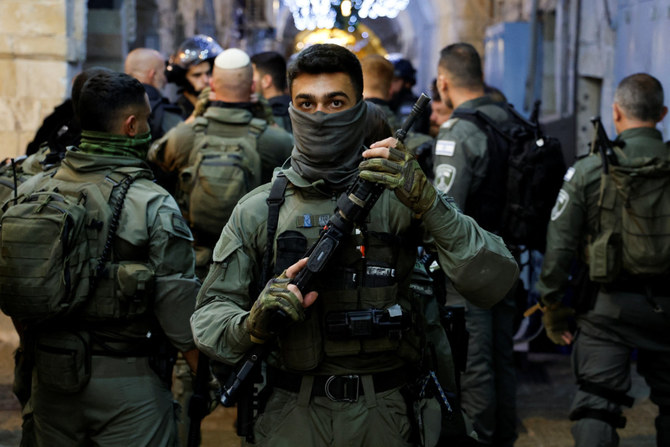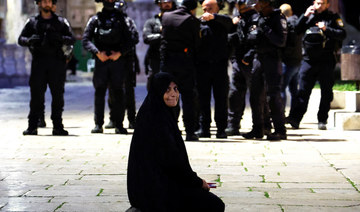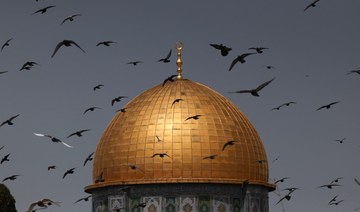JERUSALEM: Violence resumed for a second straight night in Jerusalem on Wednesday when Palestinian worshippers barricaded themselves inside Al-Aqsa Mosque at the Old City’s sensitive compound and Israeli police used force to remove dozens of worshippers.
The unrest was less intense than the previous night. But the situation remained combustible as Muslims marked the Ramadan holy month and Jews began the weeklong Passover holiday. Palestinian militants in the Gaza Strip renewed their rocket fire at Israel, raising fears of a wider conflagration.
The Palestinian Red Crescent reported at least six people were injured in the latest violence. The Islamic Waqf authorities, which manages the compound, said police fired stun grenades and rubber bullets to disperse the crowds.
The Israeli police said that “dozens of law-breaking juveniles” had fomented chaos, throwing rocks and other objects at officers and compelling police to act to restore “security, law and order.”
More Palestinians had gathered in the mosque, responding to calls by Waqf to pray inside overnight. At one of the mosque entrances, police officers could be seen escorting dozens of Palestinians out of the compound. Residents and shoppers milled around, watching social media videos on their phones showing the renewed clashes that had happened just meters away.
Early on Wednesday, Israeli police stormed the Al-Aqsa Mosque, firing stun grenades at Palestinians who hurled stones and firecrackers in a burst of violence during a sensitive holiday season. Palestinian militants in Gaza responded with rocket fire on southern Israel, prompting repeated Israeli airstrikes.
The violence had calmed by early Wednesday morning, but in the evening, Palestinian militants fired two more rockets from Gaza, with one falling short inside Gaza and the other falling near the security fence separating Gaza from Israel, the Israeli military said. There were no reports of casualties.
The mosque sits in a hilltop compound sacred to both Jews and Muslims, and conflicting claims over it have spilled into violence before, including a bloody 11-day war between Israel and Hamas, the Islamic militant group that rules Gaza. Al-Aqsa is the third-holiest site in Islam and stands in a spot known to Jews as the Temple Mount, which is the holiest site in Judaism.
Palestinian militant groups warned that further confrontation was coming, but a Palestinian official said the Palestinian Authority was in contact with officials in Egypt, Jordan, the United States and at the United Nations to de-escalate the situation. He spoke on condition of anonymity because he was not authorized to brief the media.
Israeli Prime Minister Benjamin Netanyahu said the country was working to “calm tensions” at the holy site.
People who were detained at the compound and later released said police used batons, chairs, rifles and whatever else they could find to strike Palestinians, including women and children, who responded by hurling stones and setting off firecrackers that they’d brought to evening prayers for fear of possible clashes. Outside the mosque’s gate, police dispersed crowds of young men with stun grenades and rubber bullets.
Medics from the Palestinian Red Crescent said that at least 50 people were injured. Israeli police said they were not immediately able to confirm the reports and videos showing officers beating Palestinians but said 350 were arrested. They added that one officer was injured in the leg.
Separately, the Israeli military said one soldier was shot and moderately wounded in the occupied West Bank.
Most of the Palestinians arrested from Al-Aqsa were released from detention by the early afternoon, said lawyer Khaled Zabarqa, who represents several of them. But he said that some 50 Palestinians, many of them from the occupied West Bank, were still detained and would have their cases heard at the Ofer military court on Friday. He put the total number of arrested at 450.
UN Mideast envoy Tor Wennesland said he was “appalled by the images of violence” at Al-Aqsa, condemning the beating and mass arrests of Palestinians as well as reports of Palestinians stockpiling firecrackers and rocks.
Riyad Mansour, the Palestinian UN ambassador, expressed “outrage and condemnation” at the attack, telling reporters at UN headquarters: “It is the right of the Palestinian Muslim worshippers to exercise their religious duties and prayers in this holy month of Ramadan, and in any other time in this holy Aqsa Mosque.”
Crowds of Palestinians gathered around a police station in Jerusalem on Wednesday, waiting anxiously for their loved ones to trickle out of detention. Amin Risheq, a 19-year-old from east Jerusalem, said that after being beaten and forced to lay on the floor of the mosque with dozens of others, his hands zip-tied behind his back, he was taken to the police station where he said he did not have access to a toilet, medical attention or water for over six hours.
“They treated us like animals,” he said.
Since Ramadan began March 22, scores of Muslim worshippers have repeatedly tried to stay overnight in the mosque, a practice that is typically permitted only during the last 10 days of the monthlong holiday. Israeli police have entered nightly to evict the worshippers.
Tensions have been further heightened by calls from Jewish ultranationalists to carry out a ritual slaughter of a goat in the compound, as happened in ancient times.
Israel bars ritual slaughter on the site, but calls by Jewish extremists to revive the practice, including offers of cash rewards to anyone who even attempts to bring an animal into the compound, have amplified fears among Muslims that Israel is plotting to take over the site.
Netanyahu repeated Wednesday that he’s committed to preserving the longstanding arrangement at the compound. He described the worshippers who locked themselves in the mosque as “extremists” who prevented Muslims from entering the mosque peacefully.
Over a hundred religious Jews filtered through the site on Wednesday during regular morning visiting hours, as small crowds of Muslims gathered around them shouting, “God is greater!”
Jews are permitted to visit the compound, but not pray there, under longstanding agreements. But such visits, which have grown in numbers in recent years, have often raised tensions, particularly because some Jews are often seen quietly praying.
After some 80,000 worshippers attended evening prayers at the mosque on Tuesday, hundreds of Palestinians barricaded themselves inside overnight to pray. Some said they wanted to ensure religious Jews didn’t carry out animal sacrifices. After they refused to leave, Israeli police moved into the mosque.
Israeli police said “several law-breaking youths and masked agitators” brought fireworks, sticks and stones into the mosque, chanting insults and locking the front doors. “After many and prolonged attempts to get them out by talking to no avail, police forces were forced to enter the compound,” police said.
Moayad Abu Mayaleh, 23, said he blocked a door of the mosque with hundreds of others to prevent the police from entering before they broke in.
“We can’t let them get away with this,” he said, shouting insults at Israeli police as he left the station.
In the occupied West Bank, the Palestinian leadership denounced the attack on the worshippers as a violation that “will lead to a large explosion.”
Palestinian militants responded to the events by firing a barrage of rockets from Gaza into southern Israel, setting off air raid sirens in the region as residents prepared to begin the weeklong Passover holiday.
The Israeli military said a total of five rockets were fired, and all were intercepted. Israel responded with airstrikes that the army said hit Hamas weapons storage and manufacturing sites.
“We don’t want this to escalate,” said Lt. Col. Richard Hecht, an army spokesman. But he said that if the rocket fire persisted, “we will respond very aggressively.”
The Palestinian militant groups Hamas and Islamic Jihad called for Palestinian residents of Jerusalem, the West Bank, and Israel to gather around the Al-Aqsa Mosque and confront Israeli forces. Palestinians must be prepared “for the inevitable confrontation in the coming days,” said Ziyad Al-Nakhala, leader of Islamic Jihad.
As violence unfolded in Jerusalem, the Israeli military reported fighting in a Palestinian town in the occupied West Bank. It said residents of Beit Umar, near the volatile city of Hebron, burned tires, hurled rocks and explosives at soldiers. It said one soldier was shot by armed suspects, who managed to flee.
It said later in the day that Palestinians opened fire at a checkpoint near the northern West Bank city of Jenin, leaving no casualties.
Israeli-Palestinian violence has surged over the last year, as the Israeli military has carried out near-nightly raids on Palestinian cities, towns and villages and as Palestinians have staged numerous attacks against Israelis.
At least 88 Palestinians have been killed by Israeli fire this year, according to an Associated Press tally. Palestinian attacks against Israelis have killed 15 people in the same period.
Israel says most of the Palestinians killed were militants. But stone-throwing youths and bystanders uninvolved in violence were also among the dead. All but one of the Israeli dead were civilians.





























